Understanding Retry Transactions
Overview
In today's digital economy, failed payments pose a significant risk to revenue retention and customer churn. These payment failures can disrupt customer relationships and lead to unnecessary revenue loss. Implementing an effective payment retry strategy is a crucial component of revenue recovery, helping businesses recover failed transactions while minimizing involuntary churn.
PayNearMe’s payment retry solution empowers clients to strategically tailor their retry processes for common ACH and debit card payment failures—like NSF declines—ensuring a more effective and efficient recovery of failed transactions. This document details PayNearMe’s options for payment retries and how you can optimize retry logic to improve customer retention and overall business performance.
Comparing Retry Solutions
PayNearMe supports retry payments for both ACH and debit card transactions that are returned or declined for insufficient funds. However, the retry solutions for each payment method are implemented differently in the PayNearMe platform, which can affect both the consumer and agent experience. The following table displays these differences and similarities in detail.
| ACH Retries | Debit Card Retries | |
|---|---|---|
| Type of Retry-able Transactions |
|
|
| Decline Code Trigger |
| 1051 (Network Code 51) - Insufficient Funds |
| Real-Time Retry Transactions | No | Yes |
| Number of Retries Allowed | Up to 2 | Any number up to the next scheduled payment date for autopay transactions or six days for future-dated, one-time transactions. PayNearMe recommends no more than 2 retries per transaction. |
| Scheduling Retries |
|
|
| Retry Setup | Site Configuration | Business Rules |
| Response to Clients | After Final Retry Only | After Each Retry |
| Consumer Notifications | After Final Retry Only | After Each Retry |
| Pricing | Charge for Each Return | None |
| Reporting Available | Yes | Yes |
| Cost to Consumer/Client | Yes | No |
ACH Payment Retries
For enabled clients, PayNearMe will automatically retry failed ACH payments up to two times according to NACHA rules. Clients can choose to strategically set up retry payments to occur on the next business day, two business days from the original transaction, or the next Friday after the original transaction.
Payment retries work for both ad-hoc and scheduled one-time payments and recurring autopay payments where the original transaction was returned with one of the following return codes:
- R01 – Insufficient Funds
- R09 – Uncollected Funds
All retry transactions are processed for the same amount with the same SEC code. Payments that have been refunded cannot be retried.
Consumer Experience
PayNearMe does not notify consumers via text or email when an ACH transaction is retried or in the process of being retried. After the final retry, consumers receive either the Payment Success Confirmation or a Payment Returned message to confirm the outcome of the transaction. The only way consumers can find out if their returned payments are scheduled to be retried is if they return to their original payment’s receipt page in the Consumer Portal.
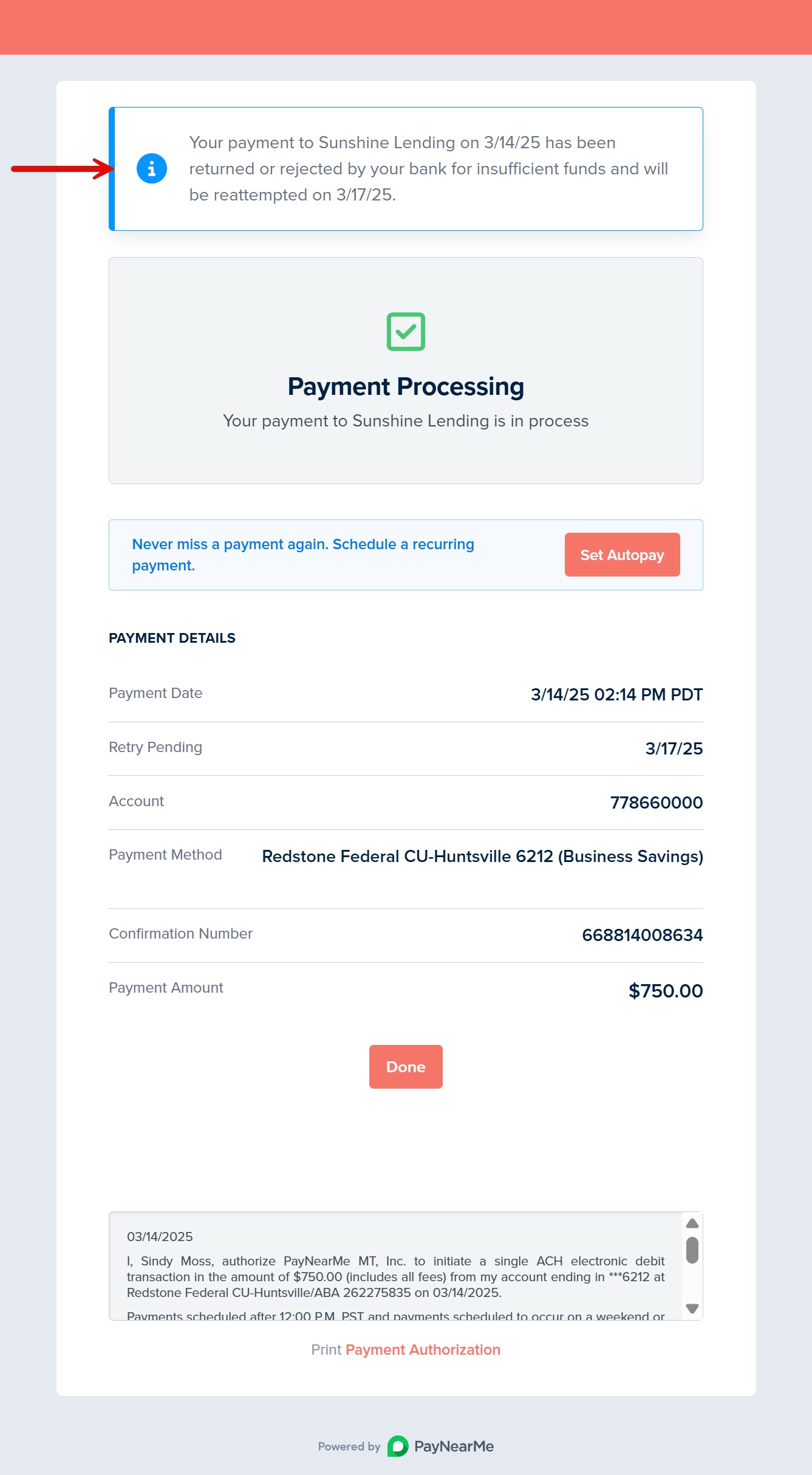
Agent Experience
ACH retry payments are automatically processed. For agents who access a consumer account where a retry is pending, the Agent Interface displays “Retry Pending” messaging on the Transactions tab of the account page and on the Payment Details page of the transaction.
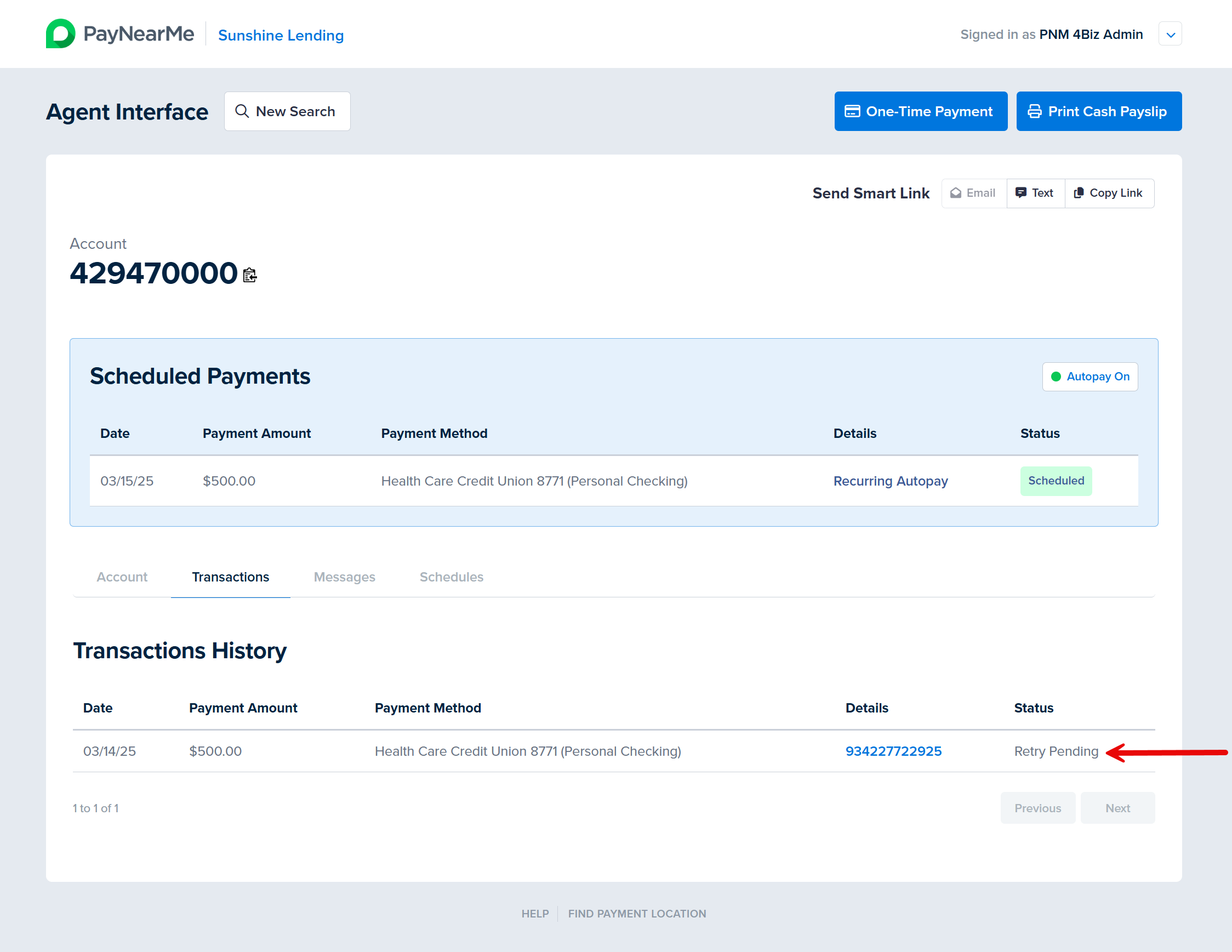
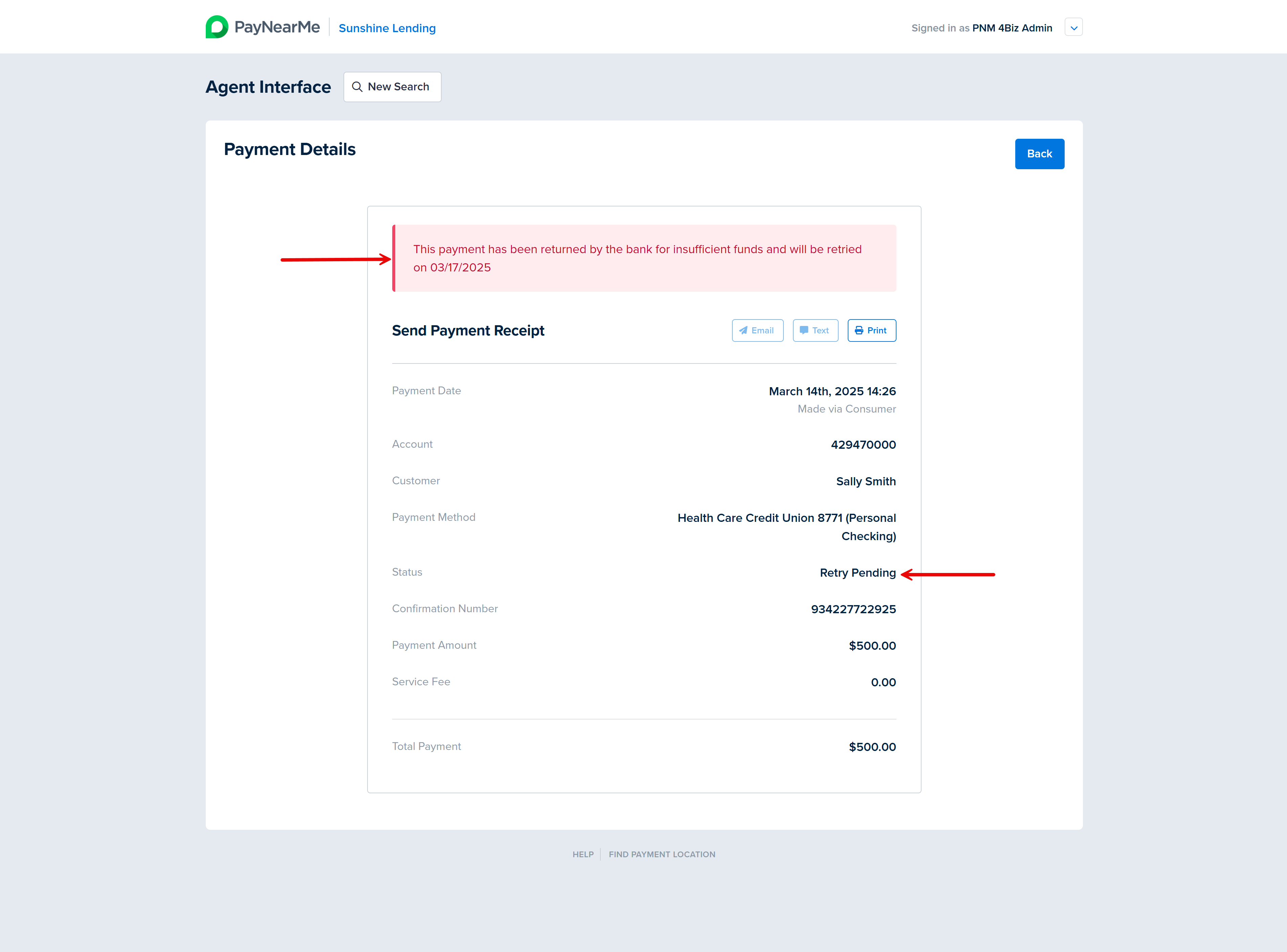
Debit Card Payment Retries
Like ACH payment retries, debit card payment retries occur automatically when a scheduled payment—either a one-time, future-dated payment or a recurring autopay payment—declines due to insufficient funds (i.e., pnm_reponse_code of 1051 or network code 51). PayNearMe can retry the payment a configurable number of hours later (default of four hours) or at a specific time of day for a configurable number of times. For example, a client may choose to retry a declined payment at 11:00PM on the scheduled payment date, while another client may choose to retry the payment up to two times every four hours after the initial payment is declined. If the original scheduled payment was attempted at 8:00AM, PayNearMe would retry the payment at 12:00PM and then again at 4:00PM.
Retry attempts for autopay payments can span multiple days up to the next scheduled payment date. Retry attempts for future-dated, one-time payments can occur up to six days after the scheduled payment date. Debit card retry payments are configured and managed through business rules, which your PayNearMe Technical Account Manager (TAM) can set up.
Unlike ACH retry payments, where the initially-declined payment is resubmitted to the bank and displays as one transaction, debit card retry payments are submitted as separate transactions. This means the Business Portal and Agent Interface display the initial declined payment and each retry payment that was made.
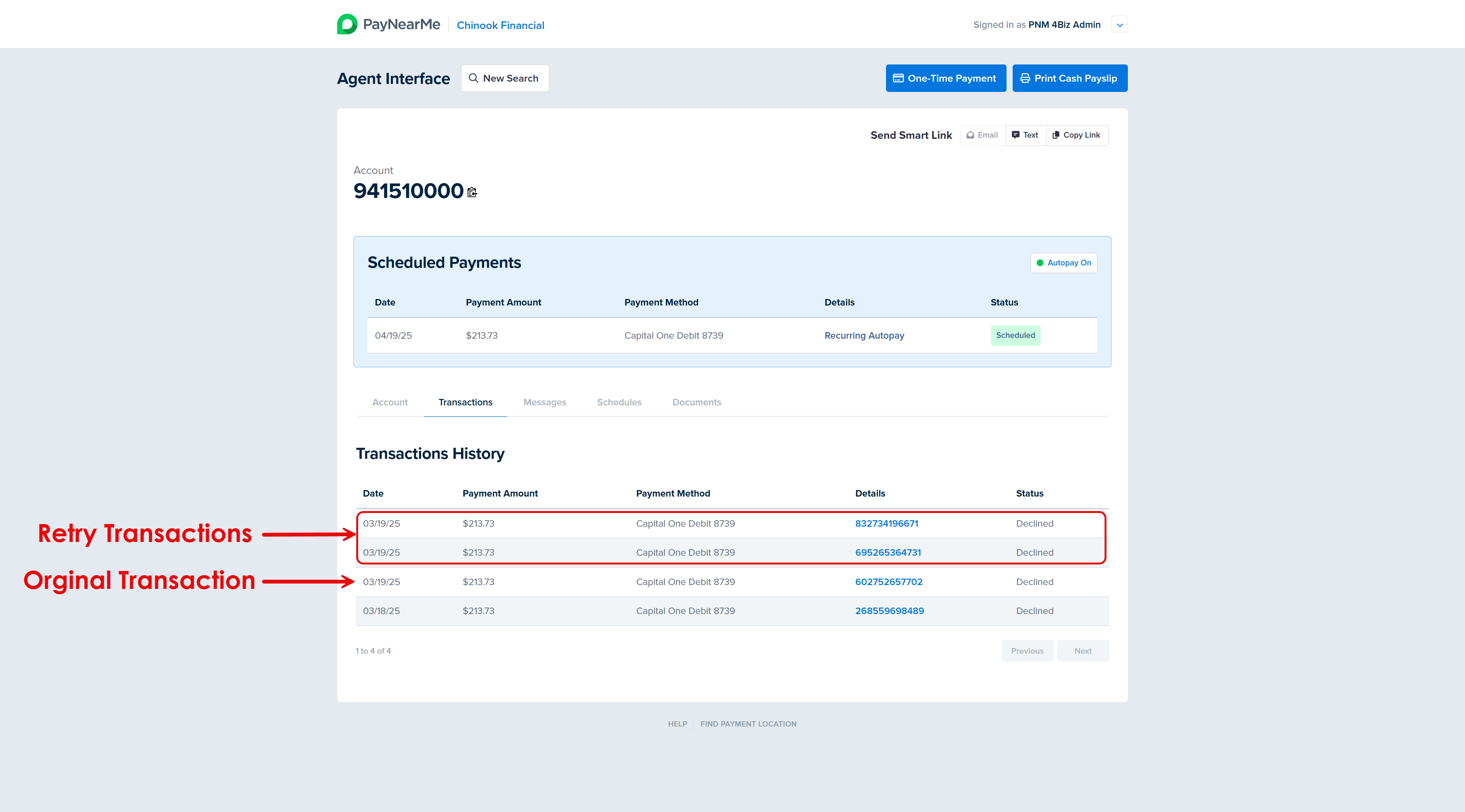
Testing TipTo simulate a debit card NSF (i.e., 1051) decline in Sandbox, use the scheduled payment amount of $213.73. This must be the total amount with convenience fees. So, if a debit card payment requires a $1.99 convenience fee, the payment amount would be $211.74.
Consumer Experience
When scheduled debit card payments decline, PayNearMe sends the consumer an SMS or email notification that the payment will be retried. See the Scheduled Payment Retry message in Standard SMS and Email Notifications for both the English and Spanish verbiage.
| Message Name | SMS | |
|---|---|---|
The payment to <pnm_payee_name> did not complete and will be retried Visit <pnm_order_url> for details |
Subject: <pnm_payee_name> - Account Notification |
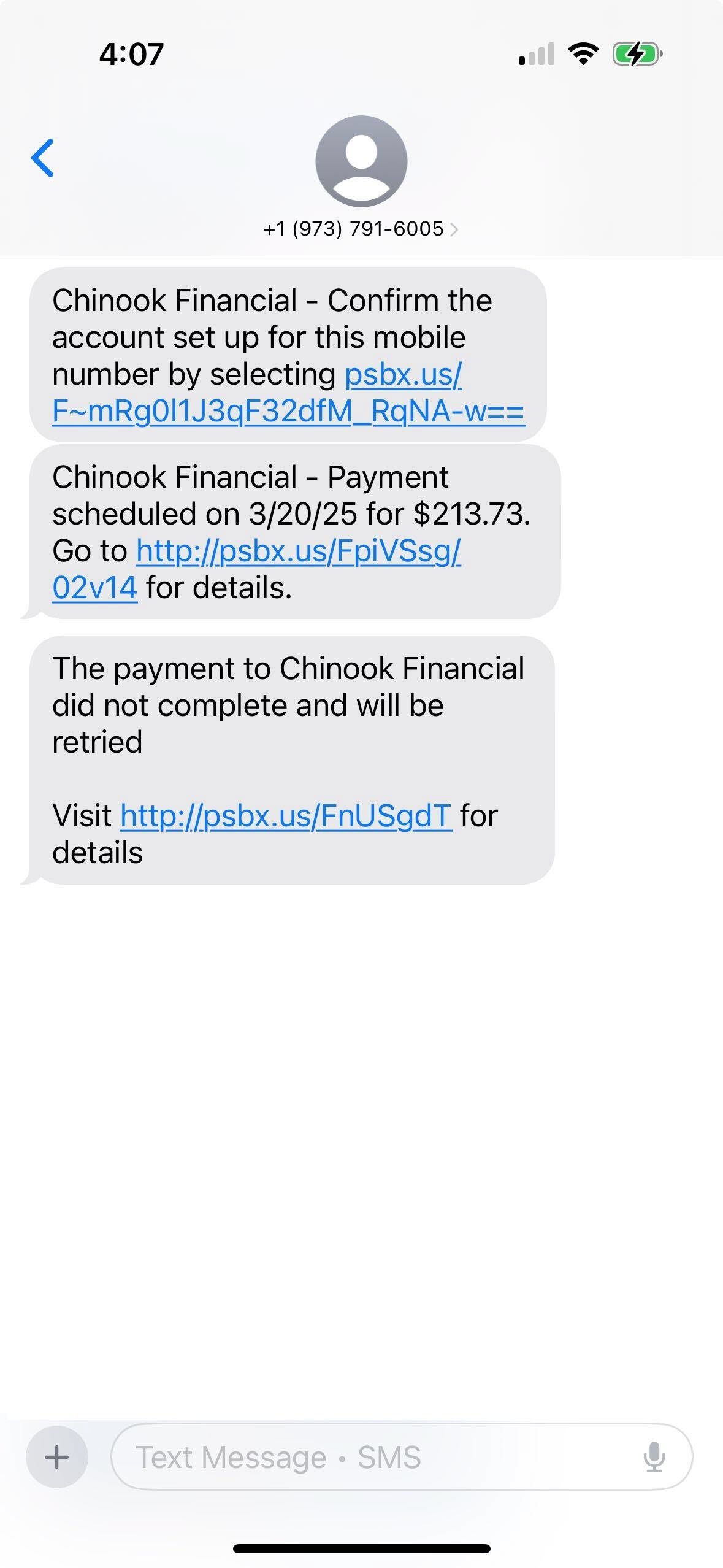
This message also includes a link to the Consumer Portal where the consumer can view details about the declined payment and the scheduled retry.
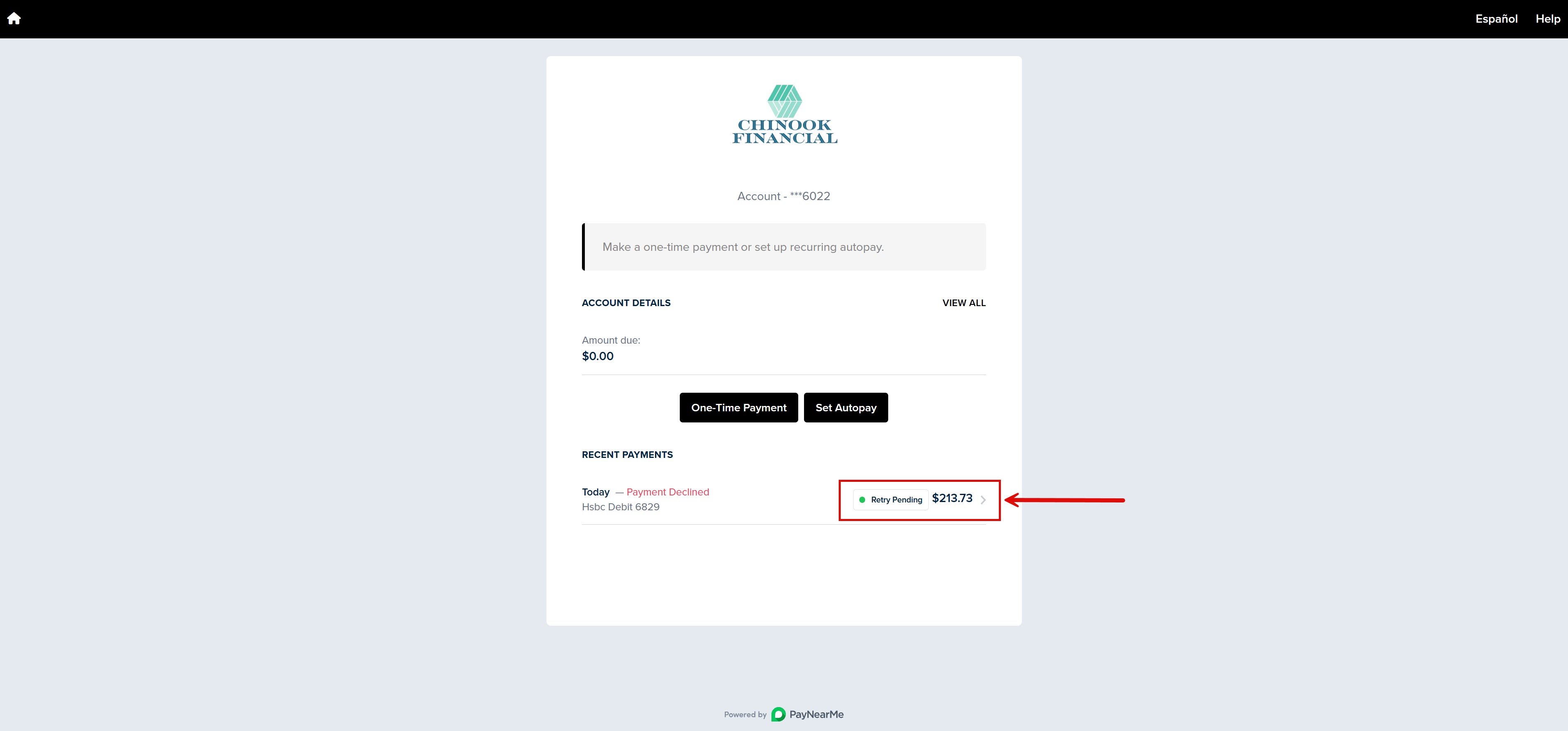
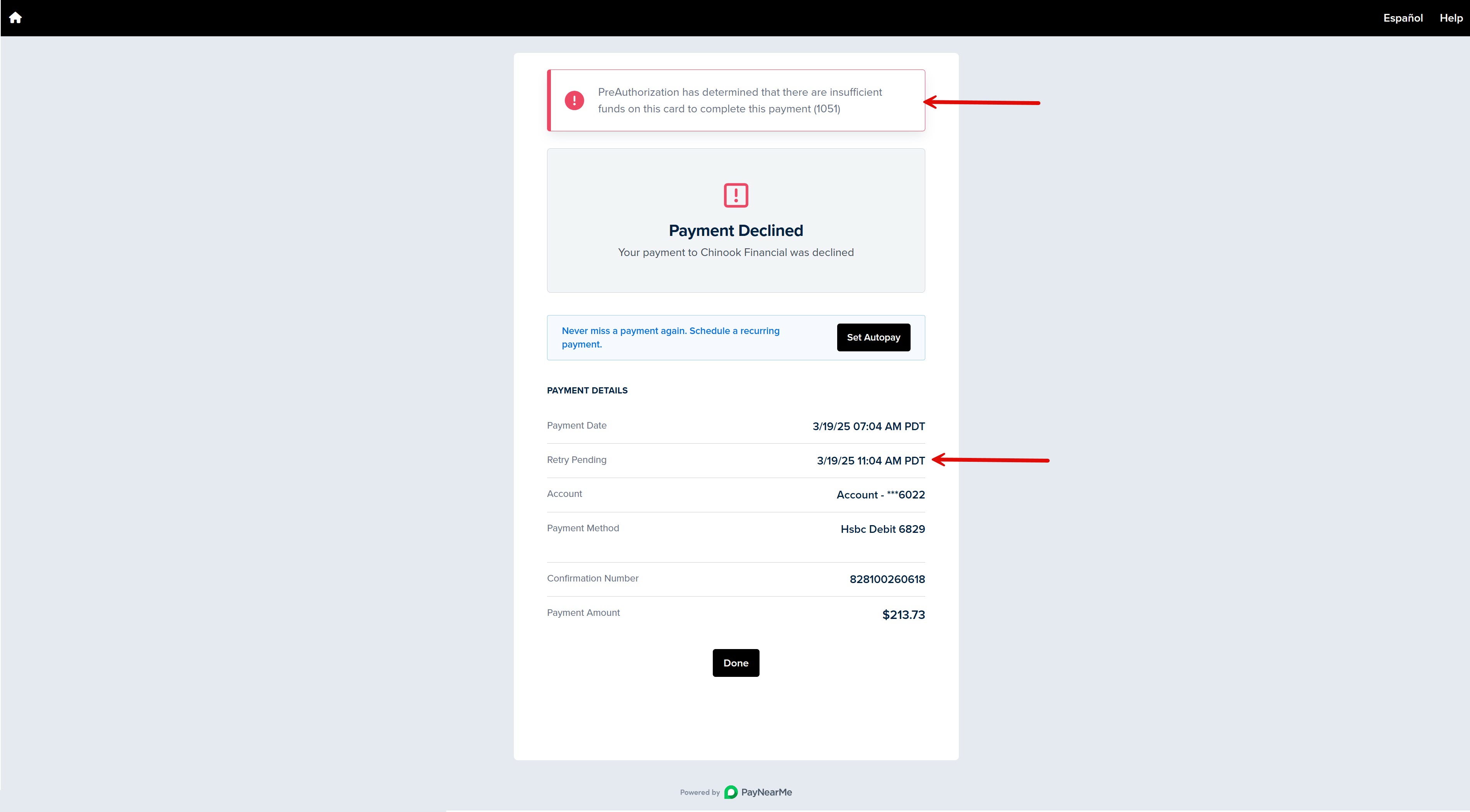
If the retry payment is successful, PayNearMe sends the consumer another SMS or email notification indicating that the payment is complete. See Scheduled Payment Retry Complete in Standard SMS and Email Notifications for both the English and Spanish verbiage.
| Message Name | SMS | |
|---|---|---|
Payment Retried - <pnm_payee_name>. The payment of <pnm_payment> is complete. Go to <pnm_order_url> for details. |
Subject: <pnm_payee_name> - Payment Completed |
Agent Experience
Like ACH retry payments, agents can see automatic debit card retry payments from the Agent Interface in the Scheduled Payments section on the Account page.
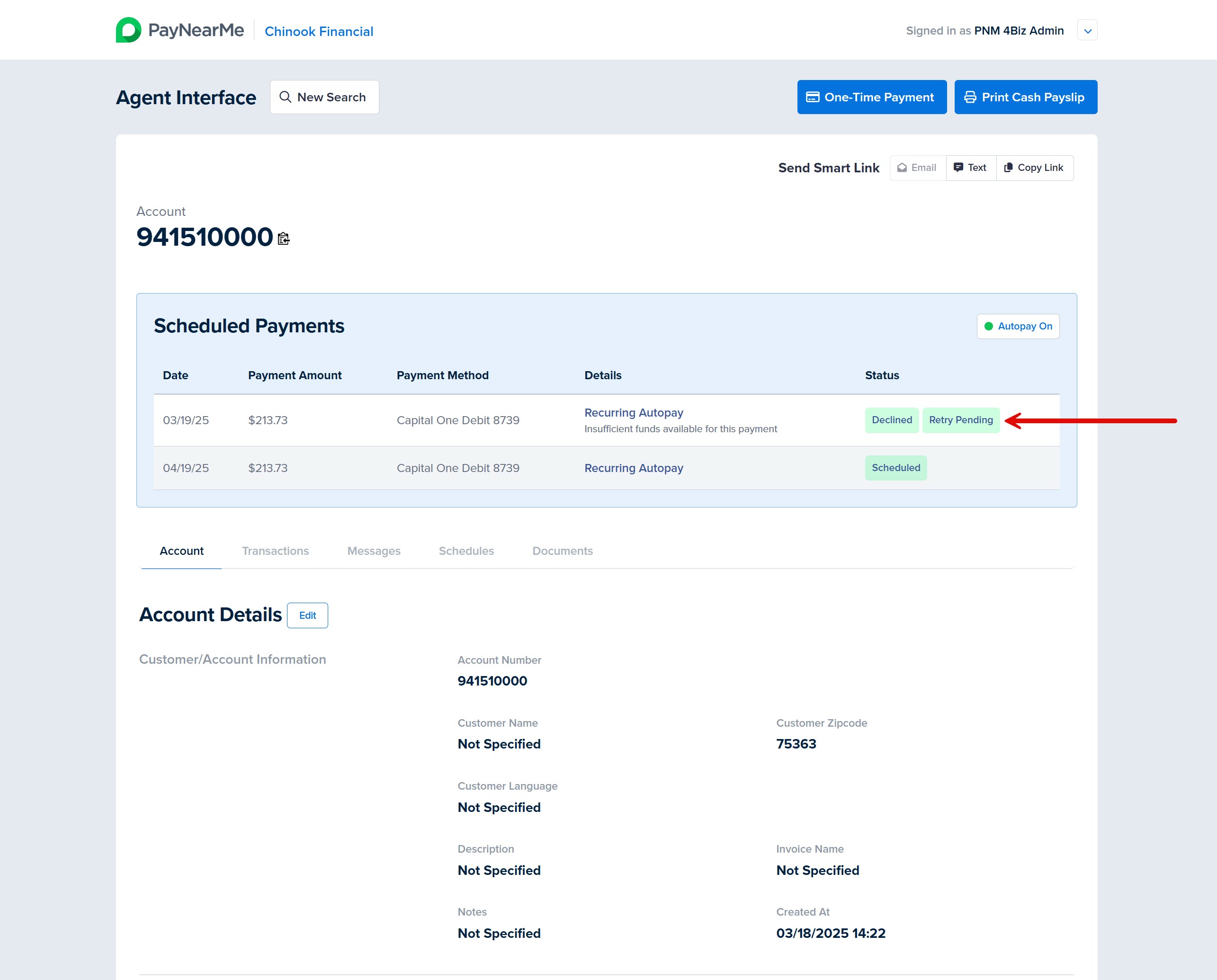
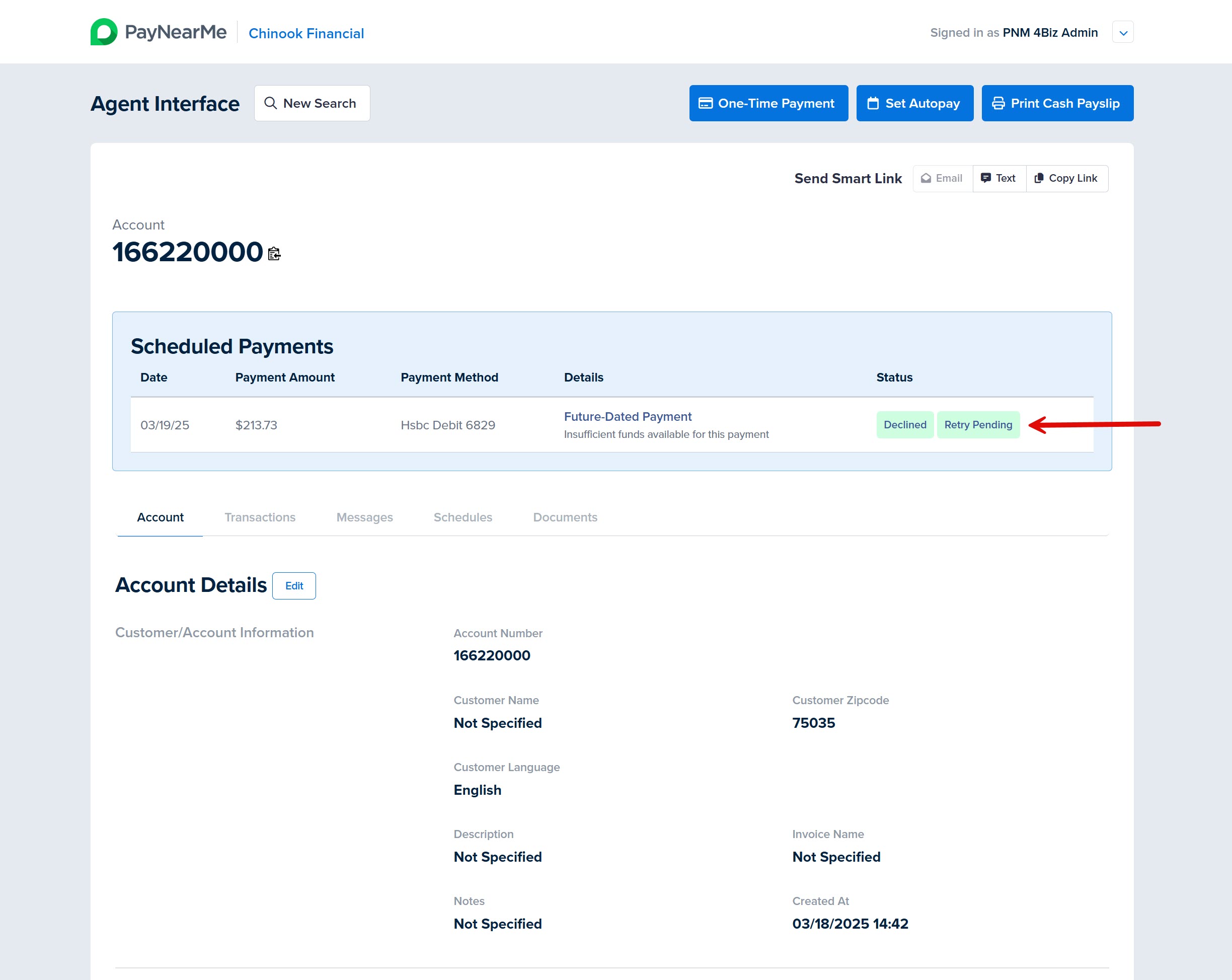
Clicking on the schedule/payment details shows the agent when PayNearMe will attempt the retry payment.
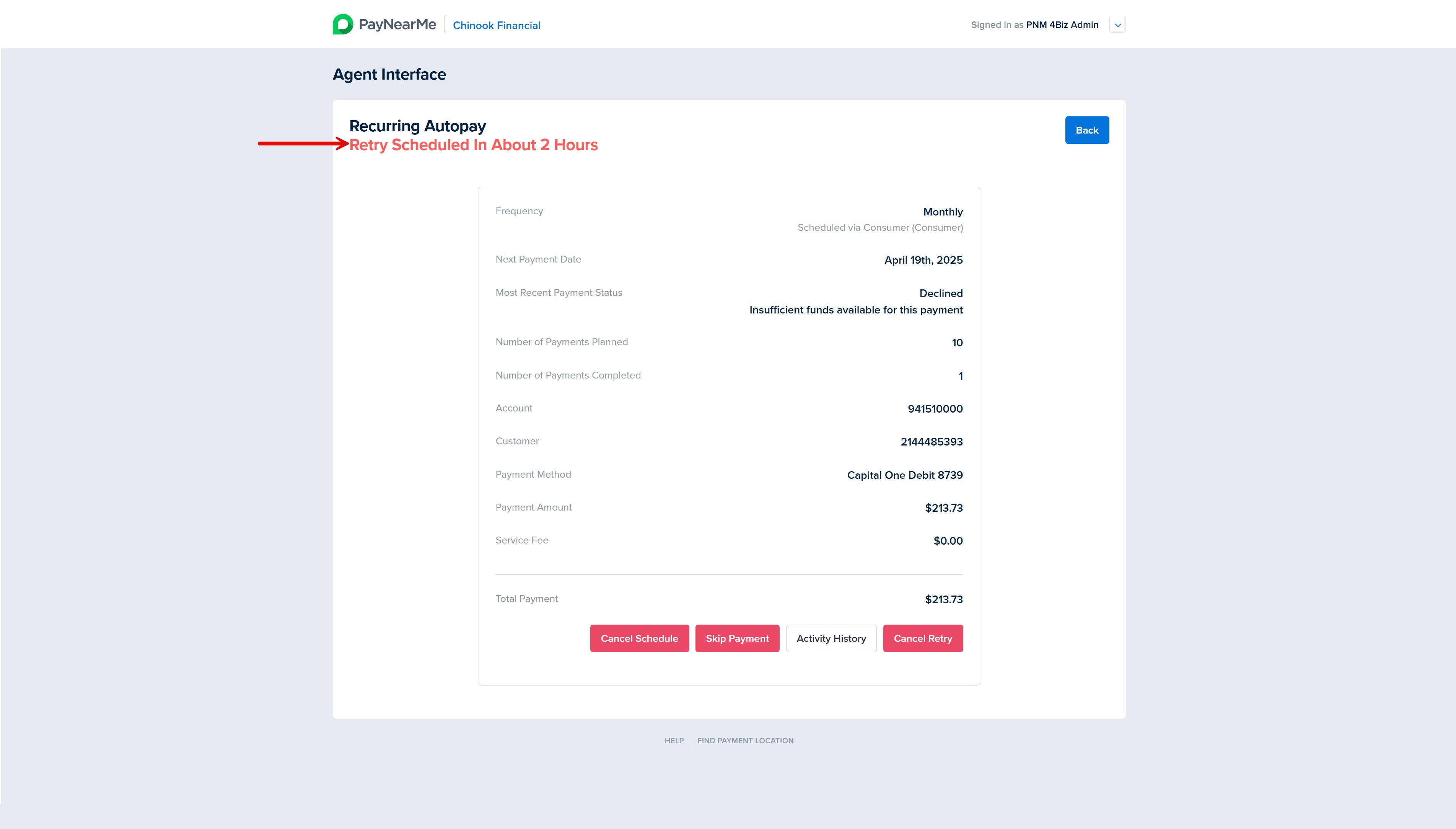
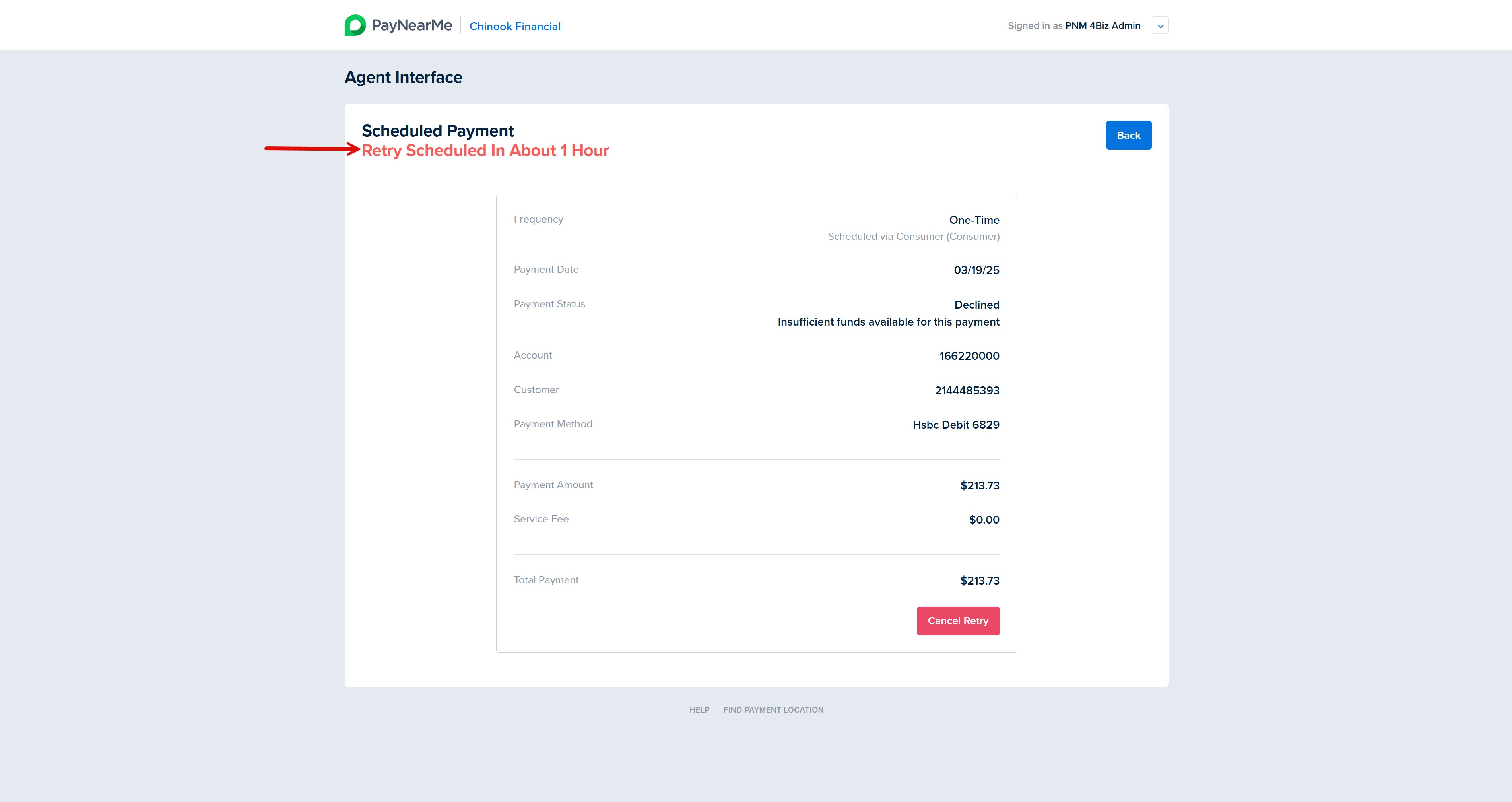
Agents can cancel pending retry payments from the schedule/payment details screen by clicking the Cancel Retry button.
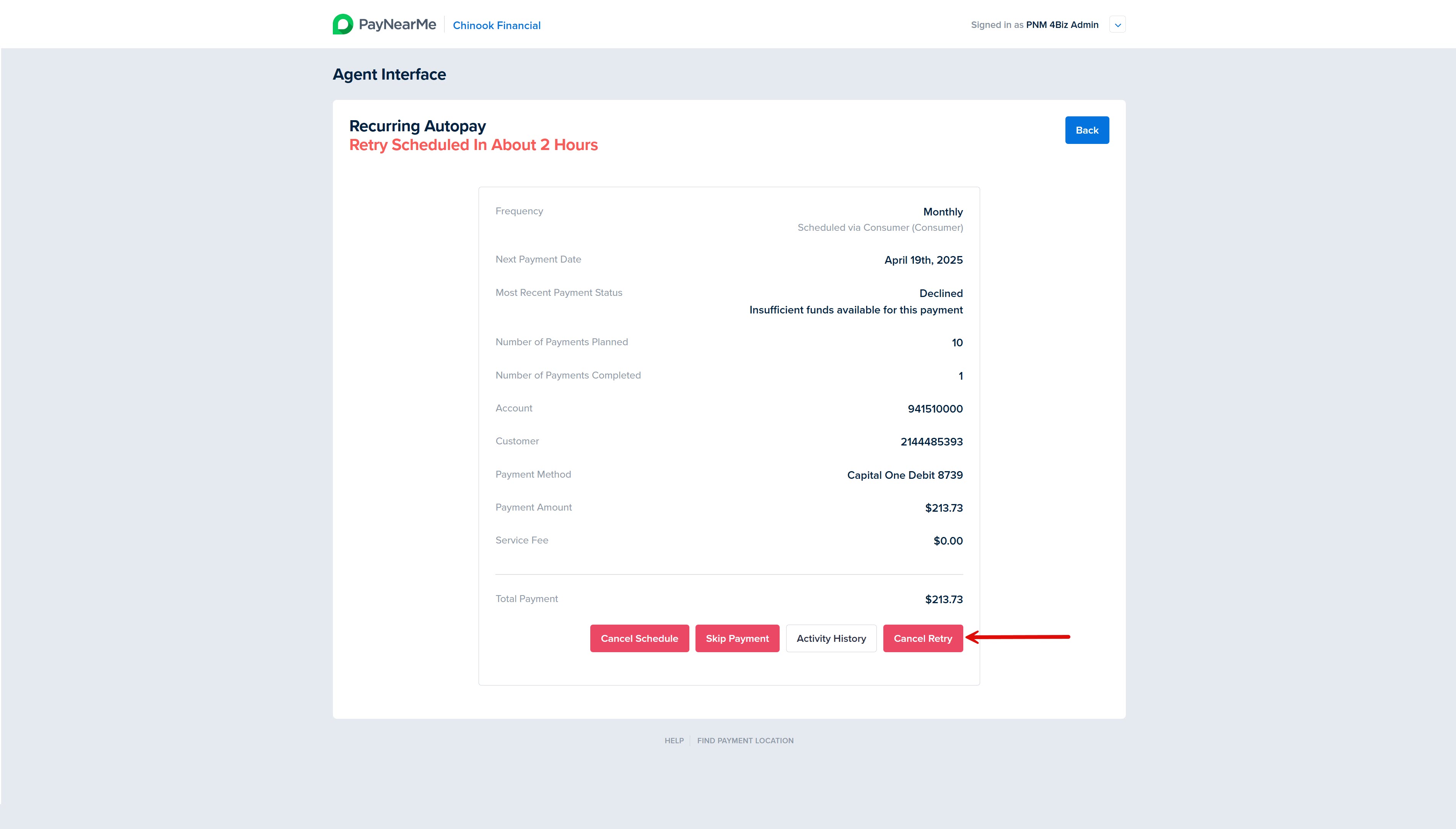
The Agent Interface asks the agent to confirm the cancelation. Once confirmed, the Agent Interface returns the agent to the schedule/payment details screen. Agents cannot skip retry payments, but they can cancel them.
Retry Payment CancelationsOnly debit card retry payments can be canceled in the Agent Interface.
Retry Payments Report
The Scheduled Payment Retry report provides clients with a list of all debit card retry payments made on that business day and whether they were successful. The following parameters are included in the report.
| Report Parameter | Description |
|---|---|
Date/Time |
The date and time when the retry payment was attempted. |
PayNearMe Order Identifier |
The PayNearMe-assigned ID of the order. |
Site Customer Identifier |
The client-assigned ID of the consumer. This is the identifier you use for the customer in your systems. |
Site Order Identifier |
The client-assigned ID of the order. This is the identifier you use for the billing account in your systems. |
Channel |
The payment channel where the scheduled payment was created. The following options are supported:
|
Sub-Channel |
The payment sub-channel where the scheduled payment was created. This column indicates whether the retry payment was from an autopay schedule (i.e., |
Merchant State |
Indicates whether the retry transaction was successful (i.e, |
Retry? |
Indicates if the transaction was a retry payment. |
Retry Type |
|
The following is an example of a Scheduled Payment Retry Report.

Updated 6 months ago